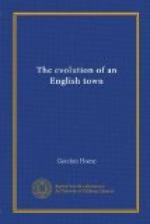Pickering appears to have been a royal possession during the whole of this time, and it is quite probable that the Norman kings hunted in the forest and lodged with their Courts in the castle, for a writ issued by Henry I. is dated at Pickering.
CHAPTER VIII
The Forest and Vale in the Time of the Plantagenets
A.D. 1154 to 1485
The story of these three centuries is told to a most remarkable extent in the numerous records of the Duchy of Lancaster relating to the maintenance of the royal Forest of Pickering. They throw a clear light on many aspects of life at Pickering, and by picking out some of the more picturesque incidents recorded we may see to what extent the severe forest laws kept in check the poaching element in the neighbourhood. We can also discover some incidents in connection with the visits of some of the English kings to the royal forest of Pickering, as well as matters relating to the repair of the castle.
In the Parliament of 1295, in Edward I.’s reign, Pickering, for the first and only occasion, sent representatives to the national assembly. The parliamentary return states[1] that the persons returned on that occasion were
Robertus Turcock
Robertus Turcock,
but whether this is a mistake by the recorder or whether two men of the same name were returned is uncertain.
[Footnote 1: G.R. Park, “The Parliamentary Representation of Yorkshire, 1886,” pp. 266 and 283.]
Among the High Sheriffs of Yorkshire in the fourteenth and fifteenth Centuries were
1390 Richard II. Jacobus de Pykering. 1394 " " " 1398 " " " 1432 Henry VI. Sir Richard de Pykering. 1450 " Sir James de Pykering knt.
In 1311 Johannes de Cropton was one of the members for Scarborough in Edward II.’s Parliament of that year.
Pickering was held as royal property by William the Conqueror, and with a few short intervals it has remained crown property until the present day. It is therefore no matter for surprise to find that several of the Plantagenet kings came to hunt in the forest. It appears to have been a royal possession in the time of Henry I., and also in February 1201, when King John visited the castle,[1] for a charter granted by him to the nuns of Wykeham is dated at Pickering. In 1248 William Lord d’Acre was made keeper of the castle, but towards the close of his reign Henry III. (1216-1272) gave the castle, manor, and forest of Pickering to his son Edmund Crouchback, and from him the property has descended through the Lancastrian branch of the royal family, so that it now forms part of the possessions of the Duchy of Lancaster.
[Footnote 1: Young’s “History of Whitby,” vol. ii. p. 733.]
From other records we find that King John was also at Pickering for at least a day in August 1208 and in March 1210.




